Archive
EG Radio May 9: the Kalamazoo River oil spill 3 years later

Photograph: State of Michigan
This week on Earthgauge, we take a look back at what happened in Michigan in 2010 when an Enbridge pipeline ruptured spilling roughly 1 million gallons of oil into the Kalamazoo River. What is the legacy of the spill and is there anything for the rest of us to learn as we debate the construction of more pipelines from the tar sands of Alberta to B.C. and the Gulf of Mexico?
I have 3 interviews on the program today:
- Susan Connelly, a local resident of Marshall, MI where the spill occurred
- Jeff Insko, founder of the Line 6B citizen’s blog, a web site for residents who have pipelines running directly beneath their property
- Josh Mogerman, spokesperson for the Natural Resources Defence Council
We’ll also have our usual update from Kathy of Ecology Ottawa on local environmental events and campaigns.
Click the audio player above to stream the show or right click here to download.
Thanks to a fellowship from the Institute for Journalism and Natural Resources, I had the opportunity to travel to Kalamazoo and the surrounding area last week to learn about the Kalamazoo River and, in particular, the Enbridge oil spill of 2010.
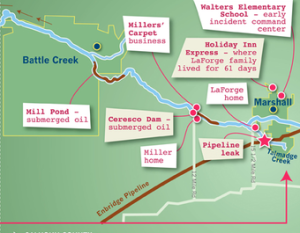
On Sunday, July 25, 2010, Enbridge Line 6B ruptured near Marshall, Mich. and released more than one million gallons of tar sands diluted bitumen into Talmadge Creek and the Kalamazoo River. Illustration by Catherine Mann for InsideClimate News.
Remember that one? It happened on July 25 just a couple weeks after BP finally sealed their leak in the Gulf of Mexico following the explosion of the Deep Water horizon oil rig that killed 11 workers.
Six inches of rain fell in the days after the Enbridge pipeline spill, raising Talmadge Creek and the Kalamazoo River into “a roiling brown torrent that overflowed its banks by several feet,” according to the seven-month, Pulitzer prize-winning investigation conducted by InsideClimate News. Talmadge Creek, which is usually five to six feet wide and a foot deep, stretched 100-feet wide after the downpour.
The spill occurred in Marshall, a community of 7,400 in southwestern Michigan. It drove 150 families permanently from their homes, yet the media spotlight never settled on their story — perhaps in part because this spill occurred 10 days after BP Plc’s Macondo well was finally capped after three months of spewing oil into the Gulf of Mexico.
Enbridge Energy Partners, a U.S. affiliate of Enbridge Inc., operated the pipeline. The company has spent more than $765 million cleaning up the spill.
Oiled sections of the Kalamazoo River reopened to the public in June 2012 — 23 months after the spill.

Photograph: State of Michigan
On today’s special show, we hear a couple different perspectives from residents who have been affected by the spill and its aftermath. First up is Susan Connelly, a local resident who was living near the oil spill when it occurred. Her kids daycare was just a half mile away so she tells us about some of the health effects her family and her community suffered immediately following the spill and in the intervening 3 years.
Susan Connelly (right click here to download):
Next we hear from another local resident Jeff Insko who started the Line 6B citizen’s blog. After the rupture of the pipeline known as line 6B, Enbridge decided to replace a huge section of pipe through Michigan, some of which runs through the property of local residents. Jeff will tell us why he has been less than satisfied in his dealings with Enbridge as they exercised their legal authority to do dig up his property and cut down all his trees in order to install new pipe. Will his experience be echoed by many other property owners as new pipelines are constructed in the coming years across North America?
Jeff Insko (right click here to download):
Finally, we hear from Josh Mogerman of the Natural Resources Defense Council on why he feels tar sands oil is much more difficult and problematic to transport through pipelines than conventional crude and how this may have played a role in the Kalamazoo spill.
Josh Mogerman (right click here to download):
First though, to get some context on what actually happened in the summer of 2010, we hear a piece from The Rachel Maddow Show on MSNBC, which was broadcast in July 2012 following the release of the US National Transportation Safety Board’s scathing report about Enbridge’s handling of the spill and their mistakes leading up to it.
Why does a pipeline rupture in Michigan matter? Well, because many plans are afoot for new pipelines from the tar sands of Alberta, including proposals through the US in the form of the Keystone XL pipeline and to the west coast of B.C. with the Northern Gateway pipeline. So today we’re going to find out about the experiences of local residents looking back 3 years later at the Kalamazoo River spill in 2010. Let’s hope we’ve learned our lessons and don’t repeat the mistakes of Kalamazoo as we debate the merits of constructing new pipelines across North America to extract even more tar sands oil at ever increasing rates.
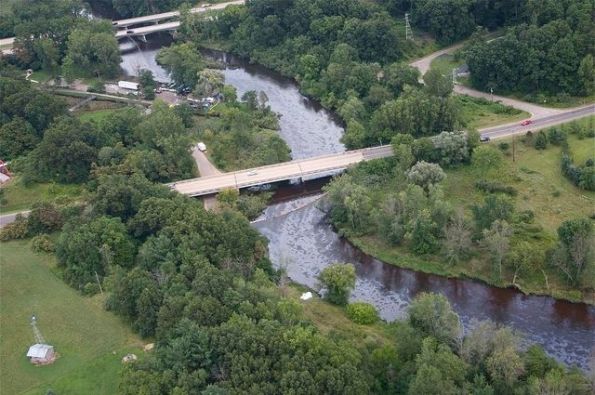
Photograph: State of Michigan
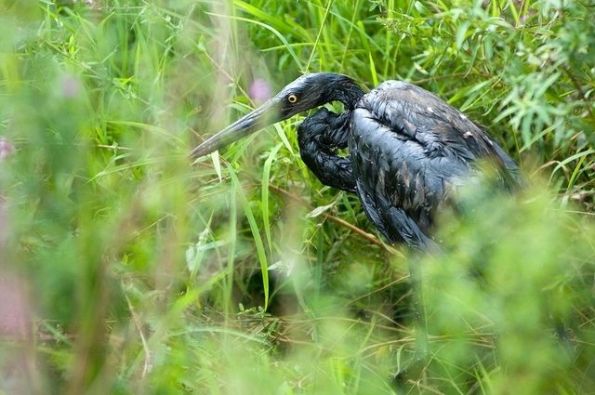
Photograph: State of Michigan
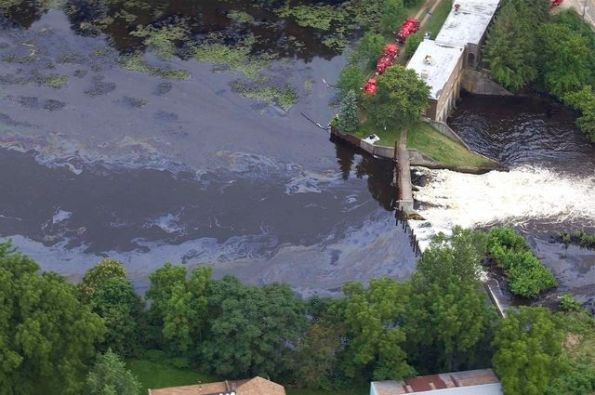
Photograph: State of Michigan
Tomorrow on EG Radio: the Kalamazoo River oil spill

This week on Earthgauge, we’ll take a look back at what happened in Michigan in 2010 when an Enbridge pipeline ruptured spilling roughly 1 million gallons of oil into the Kalamazoo River. What is the legacy of the spill and is there anything for the rest of us to learn as we contemplate the construction of more pipelines from the tar sands of Alberta to B.C. and the Gulf of Mexico?
I was in Kalamazoo and the surrounding area last week and I had the opportunity to speak with residents who have been affected by the spill and its aftermath. First we hear from Susan Connelly, a local resident who was living near the site of the spill when it occurred. Her kids’ daycare was just a half mile away so she’ll tell us about some of the health effects her family and her community suffered following the spill and in the intervening 3 years.
Next we’ll hear from another local resident, Jeff Insko, who started the Line 6B citizen’s blog. After the rupture of the pipeline known as line 6B, Enbridge decided to replace a huge section of pipe through Michigan, some of which runs beneath the property of local residents. Jeff will tell us why he has been less than satisfied in his dealings with Enbridge as they exercised their legal authority to dig up his land and cut down his trees in order to install their new pipe.
We’re also going to get an overview of the incident from Rachel Maddow of MSNBC who did a feature last summer when the US National Transportation Safety Board issued a scathing report about Enbridge’s handling of the spill and their mistakes leading up to it.
Of course we’ll also have our usual update from Kathy of Ecology Ottawa on local environmental events and campaigns. That’s at around 7:50.
Tune in tomorrow!
Earthgauge Radio September 13, 2012: From the frontlines of the Northern Gateway pipeline struggle
I’m excited to be back at CKCU to kick off the second season of Earthgauge Radio! On this the September 13 edition of the program, we hear a couple of interviews live from the frontlines of the Northern Gateway pipeline struggle in B.C. On the show today:
- Art Sterritt – Executive Director for the Coastal First Nations Great Bear Initiative
- Rafe Mair – former BC Cabinet Minister and popular radio talk show host
I visited British Columbia a couple weeks ago and had the opportunity to speak with a number of individuals who are actively engaged in the movement to stop Enbridge from building a twin pipeline from the tar sands of northern Alberta to the coastal B.C. port of Kitimat. Having just returned I can tell you that this issue is really heating up and will only become more so in the months to come.
It’s been an eventful summer with the premiers of Alberta and B.C. publicly squabbling over Northern Gateway, media baron David Black proposing to build a $13 billion oil refinery to process tar sands bitumen in Kitimat, and the resumption of public hearings that are taking a closer look at the controversial project. Northern Gateway is indeed becoming a defining battle not only for Canada’s environmental movement but for the very energy future of this country. Given the high stakes not just for BC and Alberta but for the entire country, I thought this would be a good place to kick off our second season of Earthgauge Radio.
I have two interviews on today’s program. First we hear from Art Sterritt – Executive Director of the Coastal First Nations Great Bear Initiative who will explain why First Nations along the BC coast are so opposed to the Northern Gateway proposal and how Aboriginal opposition may well prove to be an insurmountable obstacle for Enbridge and the Harper government to overcome in the efforts to build this pipeline.
We also hear from a former BC Environment Minister and well-known radio talk show host Rafe Mair. Having worked inside the provincial government at the highest levels, Mair knows very well how politicians, bureaucrats and corporations will try to sell unpopular ideas to a skeptical public so you’ll want to stay tuned to hear what he has to say about this.
Earthgauge Radio is broadcast every Thursday morning at 7:00-8:00 AM on CKCU 93.1 FM in Ottawa. Online at www.ckcufm.com with podcasts on iTunes. ‘Like’ us at www.facebook.com/EarthgaugeRadio.
Earthgauge Radio kicks off season 2 tomorrow morning on CKCU!
Tune in to CKCU FM 93.1 tomorrow morning from 7:00-8:00 AM for the launch of the second season of Earthgauge Radio! On tomorrow’s show, I’ll be bringing you two interviews from the frontlines of what is shaping up to be one of the defining environmental struggles in recent Canadian history: the Enbridge Northern Gateway pipeline.
I was out in B.C. this summer and I had the opportunity to speak with a number of individuals who are actively engaged in the movement to stop Enbridge from building a twin pipeline from the tar sands of northern Alberta to the coastal B.C. port of Kitimat. In the wake of an eventful summer in which the premiers of Alberta and B.C. have been publicly squabbling about the project, media baron David Black has proposed building a $13 billion oil refinery to process the tar sands bitumen in Kitimat, and the public hearings looking at the controversial project have now resumed, Northern Gateway is indeed becoming a defining struggle for the very energy future of this country. Given the high stakes, this is a great issue to kick off our second season of Earthgauge.
On the show tomorrow, we’ll hear from Art Sterritt, the Executive Director for the Coastal First Nations Great Bear Initiative, and Rafe Mair, the former B.C. Environment Minister and well-known talk/news radio host.
Tune in tomorrow and every Thursday on CKCU 93.1 FM in Ottawa. If you miss the show, you can always download the podcast in iTunes. Just search the podcasts for ‘Earthgauge’ and you’ll find us. Also please visit and ‘like’ our Facebook page.
Pro-development B.C. community says no to Northern Gateway
In Public Opinion Research conducted by the District of Fort St. James 198 respondents indicated a significant majority (86%) opposed the Northern Gateway pipeline proposal.
The following letter was put on the Joint Review Panel registry last Friday, and spells out the enormous difficulty industry and the Harper government face in getting tar sands pipelines built to the B.C. coast. It’s not just the so-called “foreign-funded radicals” who are opposed to this project. Even industry towns such as Fort St. James that have typically relied on natural resource exploitation for their economic livelihoods are deeply troubled by the Enbridge pipeline proposal.
This story first appeared in the Vancouver Sun: Pro-development B.C. community says no to Northern Gateway | Vancouver Sun.
Dear Sir or Madam,
On Wednesday July 18, 2012 the District of Fort St. James Mayor & Council passed a unanimous resolution to oppose the Enbridge Northern Gateway Project. The District registered as a Government Participant in the Joint Review Panel process in 2011, without a decision at that time to formally support or oppose the project but to listen objectively to information as it was shared. The decision of Mayor and Council to oppose the project came after extensive community consultation with their residents as well as numerous presentations by Enbridge to Mayor and Council.
For decades the community of Fort St. James has relied on an established forest industry as our primary economic driver and employer. Residents in Fort St. James are comfortable with industry and the economic opportunities it brings in regards to natural resource extraction and value-added manufacturing. Residents of Fort St. James are keen to diversify their economy and participate actively in economic opportunities as they arise. They are also wary of situations where industry seeks to profit while local residents shoulder the risk and long-term environmental costs.
Our community members are strongly devoted to Fort St. James largely in part to the quality of life enjoyed as a result of access to clean water and vibrant wilderness. Our residents participate in lifestyle activities such as hiking, swimming, canoeing, boating, fishing, hunting, trapping, sailing and camping at our doorstep on Stuart Lake, Stuart River and Pitka Creek as well as other wilderness areas as part of our local environment. Many of our residents rely on our environment for their way of life, through hunting, fishing, foraging (berries, mushrooms, medicinal plants, etc.), logging, and trapping by sustainable practices. Notable animal species in our area include grizzly bear, black bear, sockeye salmon, fisher, wolverine, cougar, moose, white tail and mule deer, and the trumpeter swan.
The Enbridge Northern Gateway Pipeline as proposed would have a pumping station located just South of our municipal airport, and would cross the Stuart River and the Pitka Creek, which flows into the Stuart Lake and provides the aforementioned opportunities relating to recreational wilderness access as well as integral habitat for the animal species listed above. Many residents rely on ground water wells or access drinking water from the Lake and nearby waterways. Rural residents living nearby the proposed pump station location use their property for both commercial and personal farming activities. Recreational vehicle users of snowmobiles and ATVs have an extensive network of trails, many of which would cross where the proposed pipeline would run, raising concerns over motorized vehicle access restrictions as a result of National Energy Board legislation and threatening impacts on our developing tourism industry.
The message strongly conveyed by residents to Mayor and Council was that NO AMOUNT of potential economic benefit could outweigh the potential risks should a spill occur in or nearby the Stuart River and Stuart Lake. For residents, their connection to the land base and natural water sources is too intertwined for consideration of an industrial activity which puts their livelihoods at risk. Read more…
Earthgauge Radio August 2, 2012: The Enbridge Northern Gateway Pipeline (encore edition)
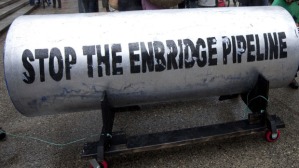
On Earthgauge Radio this week, we continue with our ‘best of’ summer series with a program originally broadcast back in January on an issue that only continues to grow in importance: the proposed Enbridge Northern Gateway Pipeline.
I have 3 interviews on today’s ‘encore’ show:
- Emma Gilchrist, Communications Director for the Dogwood Initiative
- Energy analyst and geoscientist, David Hughes
- Author and journalist, Murray Dobbin
Hearings of the National Energy Board looking into the pipeline proposal got underway in B.C. back in January with over 4000 people scheduled to speak as intervenors. The oil industry in Canada and the federal government are pushing hard to see that the pipeline is built, yet opposition to the project, particularly among First Nations communities along the proposed pipeline route, is fierce. Just last week at a meeting of Canadian premiers, BC premier Christy Clark insisted that her province should receive more economic benefits if the pipeline is built as BC is shouldering all the environmental risk. Alberta premier Alison Redford, who is trying to push forward a national energy strategy, promptly rejected Clark’s demands.
So what’s all this about? If constructed, the Northern Gateway pipeline would transport heavy bitumen oil from the tar sands of northern Alberta to the north coast of BC. The pipeline company Enbridge wants to build two 1200km pipelines – one would take 500,000 barrels a day of tar sands crude across the Rockies to Kitimat on the B.C. coast, where over 200 supertankers a year would take the oil for export to the U.S. and Asia. A second pipeline in the other direction would take a natural gas condensate back to the tar sands, which helps the oil flow through the pipe. The pipelines would cross hundreds of rivers and streams and pass through a region renowned for its salmon, wolves, bears and other wildlife. It would also help to triple the production of tar sands crude, which is among the dirtiest and most destructive forms of energy, thereby greatly increasing Canada’s greenhouse gas emissions.
Although the National Energy Board hearings looking into the costs and benefits of the project have not yet concluded, the federal government has already weighed in with Prime Minister Stephen Harper saying that the pipeline is in the national interest and must proceed while federal Natural Resources Minister Joe Oliver has labelled those opposed to the project, which includes environmentalists, fishermen, ranchers, ordinary citizens and First Nations, as foreign-funded radicals.
Not surprisingly, the proposed project has sparked an eruption of opposition among those who see the possibility of an oil spill as a critical threat to the environment and the livelihoods of tens of thousands of people. Northern Gateway would have to cross the lands and waters of many BC First Nations, the vast majority of whom are opposed to the project, some maintaining that it must be stopped at almost any cost. Last December, 130 aboriginal groups in B.C. said they were joining forces to use “whatever means necessary” to stop the project.
Meanwhile, industry and the Harper government say exploiting Canada’s abundant tar sands is vital for prosperity, particularly in light of a decision of US president Barack Obama last December to delay approval of the equally controversial Keystone XL pipeline which would transport tar sands crude to the Gulf of Mexico. Given this delay, Harper said recently that, “it is particularly essential for this country that we have the capacity to sell our energy products into the growing markets of Asia.”
And back in March the Harper govt really put the boot to environmental groups by releasing a Budget that would allow the Conservative Cabinet to overrule any final decision of the National Energy Board, effectively rendering the hearings a useless token exercise. And if this wasn’t enough to satisfy the PM’s contempt for all things environmental, the government also announced $8 million in new spending to investigate the political activities of charitable orgs by which just about every observer takes to mean those pesky environmental groups. The Harper government has also retroactively limited the time length of reviews of major resource projects, thereby effectively cutting short the NEB hearings, which, because of the sheer massive scale of the project were scheduled to continue into next year. Now they could well be over within a matter of months.
These measures have only seemed to galvanize opposition both to Gateway and to the federal government’s heavy-handed tactics in dealing with this issue. Add to all this the report released just last week by the US National Transportation Safety Board, which was looking into an oil spill from an Enbridge pipeline into the Kalamazoo River in Michigan in 2010. The Safety Board characterized Enbridge as “Keystone Kops” who ignored safety procedures while suffering “pervasive organizational failures.”
One thing we can say for sure – a long and bitter fight lies ahead with some calling it the most significant environmental battle in Canadian history. So given that it’s been in the news once again and will continue to be for some time to come, today on Earthgauge Radio I re-broadcast our special program from January of this year on Gateway. First we hear from Emma Gilchrist of the Dogwood Initiative who talks about some of the possible environmental impacts of the project and updates us on the progress of the NEB hearings. Then we hear from the respected geologist David Hughes who discusses whether there is even a need for the project from the perspective of Canada’s strategic energy reserves. And finally for the political perspective I speak with the journalist Murray Dobbin who fills us in on how the federal government is manoeuvring to ensure that the project be approved despite all the opposition to it.
Earthgauge Radio is broadcast every other Thursday morning at 7:00-8:00 AM on CKCU 93.1 FM in Ottawa. Online at http://www.ckcufm.com with podcasts on iTunes.
Trailbreaker: Yet Another Tar Sands Pipeline in the Works
Check out my latest article in the Common Sense Canadian on the planned Trailbreaker pipeline. Although the project has yet to be officially confirmed, speculation is rife that Enbridge wants to see tar sands oil transported from northern Alberta through Montreal to Portland, Maine where it would then be shipped to foreign markets. With all the media attention surrounding the proposed Northern Gateway and Keystone XL pipelines, Trailbreaker has been slipping under the radar…so far.
Here’s an excerpt from the article:
It seems the Canadian government is quite serious about plans to triple production of tar sands bitumen and would not be satisfied even if they were somehow able to bulldoze public opposition to Keystone and Gateway.
This so-called Trailbreaker project would appear to present fewer regulatory obstacles, as it would not require construction of a new pipeline. Instead, the flow of the existing Portland-Montreal pipeline, which currently brings oil from Africa and the Middle East into eastern Canada, would simply be reversed.
Enbridge, the company behind both Trailbreaker and Northern Gateway, has already requested fast-track approval from the National Energy Board of their $16.9 million plan to reverse the flow of tar sands crude from western Canada to Montreal. Yet according to Dylan Voorhees, Clean Energy Director of the Natural Resources Council of Maine, this is merely phase one of a plan that would then be followed by a reversal of the Portland Montreal Pipeline. The NRC believes that by splitting the project into pieces, Enbridge is attempting to bypass full regulatory and public scrutiny.
Read the full article here.
Now that Keystone XL has been delayed, all eyes turn to the west coast – Enbridge Northern Gateway the next tar sands battleground
A big congratulations goes out to protest organizers and all those who have been campaigning against 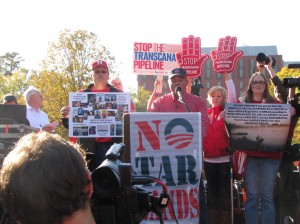 Keystone XL for many months now (if not longer). 350.org founder Bill McKibben deserves particular praise for his tireless efforts. A few days after last week’s protest in D.C. the Obama Administration decided to delay a decision on whether to approve the Keystone pipeline for at least a year. Whether the decision was related to environmental issues, concerns about the proposed route over Nebraska’s Ogallala Aquifer, the incompetence and nepotism of the State Department project evaluation, or some other (political?) consideration, the fact is that the project has been delayed giving opponents more time to organize against the pipeline. Some feel the project may never go ahead as investors are losing confidence and the whole process is simply costing TransCanada, the company that wants to build the pipeline, too much money. I’m not so sure about this. It’s still far too early to claim victory in my view. And if Obama loses next year’s election, it will put the decision in the hands of his Republican opponent. There can be little doubt about how a Mitt Romney or Rick Perry might rule on this issue.
Keystone XL for many months now (if not longer). 350.org founder Bill McKibben deserves particular praise for his tireless efforts. A few days after last week’s protest in D.C. the Obama Administration decided to delay a decision on whether to approve the Keystone pipeline for at least a year. Whether the decision was related to environmental issues, concerns about the proposed route over Nebraska’s Ogallala Aquifer, the incompetence and nepotism of the State Department project evaluation, or some other (political?) consideration, the fact is that the project has been delayed giving opponents more time to organize against the pipeline. Some feel the project may never go ahead as investors are losing confidence and the whole process is simply costing TransCanada, the company that wants to build the pipeline, too much money. I’m not so sure about this. It’s still far too early to claim victory in my view. And if Obama loses next year’s election, it will put the decision in the hands of his Republican opponent. There can be little doubt about how a Mitt Romney or Rick Perry might rule on this issue.
In the meantime, Canada’s Finance Minister Jim Flaherty told Bloomberg News on Friday that “It may mean that we may have to move quickly to ensure that we can export our oil to Asia through British Columbia.” Oh, really? It sure didn’t take long for the Canadian government to throw down the gauntlet. It is safe to assume that the ground will now shift quickly and the Enbridge Northern Gateway pipeline will soon become the next heated tar sands debate. Opponents such as environmentalists and Aboriginal groups in B.C. would do well to get themselves organized now and be prepared for the war that is sure to be waged by the tar sands industry and the governments of Canada and Alberta on behalf of Northern Gateway. They will not want to lose another fight to get their oil to market.
Still, for now we can celebrate a small victory over Keystone XL. The decision to delay was quite remarkable given the current dismal economic climate in the U.S. and the well-financed campaigns being waged by TransCanada and the Canadian/Albertan governments promising jobs and economic growth should Keystone be approved.
In the end, a collection of environmental and labour groups, Nebraskan residents, a few politicians and a handful of prominent spokespeople have managed to, temporarily at least, derail the $7 billion project. As Bill McKibben wrote in an email soon after the decision was announced, “It’s important to understand how unlikely this victory is. Six months ago, almost no one outside the pipeline route even knew about Keystone. One month ago, a secret poll of “energy insiders” by the National Journal found that “virtually all” expected easy approval of the pipeline by year’s end. As late as last week the CBC reported that Transcanada was moving huge quantities of pipe across the border and seizing land by eminent domain, certain that its permit would be granted. A done deal has come spectacularly undone.”
Soon after the delay was announced, Naomi Klein tweeted that when the campaign against Keystone XL began, “most Americans hadn’t heard of the tar sands, let alone Keystone. This is what 3 months of amazing campaigning can do.” Let’s hope we see the same thing in B.C. when Northern Gateway heats up in 2012.